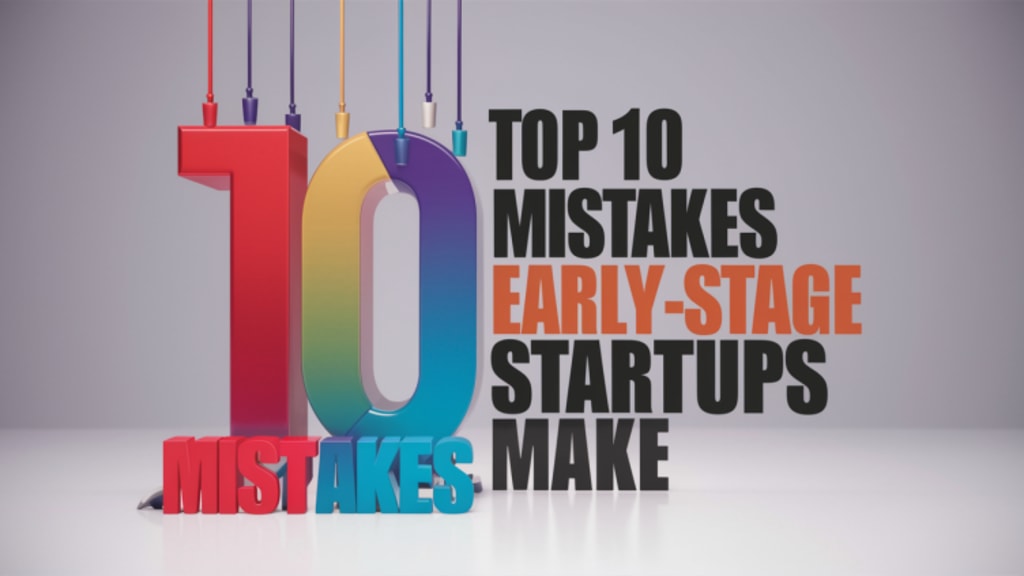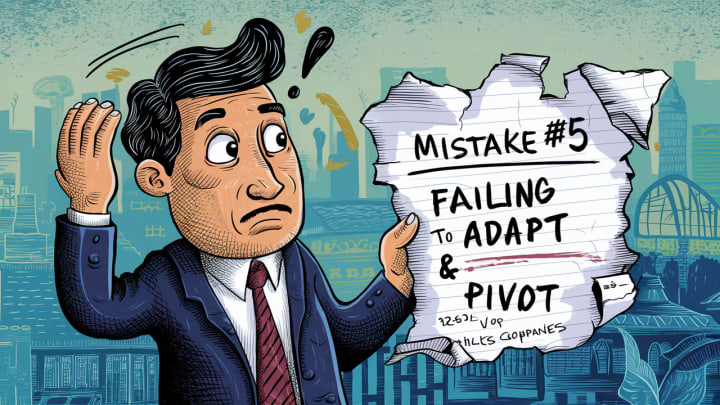Top 10 Mistakes Early-Stage Startups Make (And How to Avoid Them)
From Fatal Flaws to Fast Forward: 10 Mistakes Early-Stage Startups Make (And How to Avoid Them)

Remember Philz Coffee? Launched in 2002 with a quirky ordering system and delicious beans, it had all the makings of a hot new coffee chain. However, by 2017, they were forced to close most of their locations. What went wrong? Industry rumors point to a stubborn refusal to adapt their unique (and some might say chaotic) ordering process, ultimately leading to frustrated customers and a fizzled business.
This is just one cautionary tale in the wild world of startups. The entrepreneurial spirit burns bright, fueled by the dream of building something innovative and leaving your mark. But the path from passionate ideas to thriving businesses is littered with obstacles. These obstacles, often self-inflicted, can act as fatal flaws that derail even the most promising ventures.
The good news? By learning from the mistakes of others, you can significantly increase your chances of success. This guide will equip you with the knowledge to dodge those fatal flaws and navigate the startup journey with confidence. We'll delve into the top 10 mistakes early-stage startups make, providing actionable tips and insights to help you steer clear of these pitfalls and propel your venture toward long-term success.
Mistake #1: Lacking a Clear Vision & Value Proposition

Imagine sailing a vast ocean without a compass or a destination in mind. That's essentially what happens when a startup launches without a clear vision and a compelling value proposition. A well-defined vision serves as your guiding star, outlining the ultimate purpose and impact your company strives for.
Equally important is a strong value proposition, which essentially answers the question: "Why should someone care about your product or service?" It's your unique selling proposition (USP) that differentiates you from competitors and resonates with your target audience.
Here's how to avoid this critical mistake:
Conduct Market Research: Before setting sail, thoroughly research your target market. Understand their needs, pain points, and existing solutions. Identify gaps in the market where your product or service can offer a unique benefit. Tools like surveys, focus groups, and competitor analysis can be invaluable in this stage.
Identify Your Niche: Don't try to be everything to everyone. By focusing on a specific niche, you can tailor your message and offer to a well-defined audience. This allows for deeper customer understanding and stronger brand positioning.
Craft a Compelling Value Proposition: Here's a simple formula: We help [Target Audience] with [Their Pain Point] by [Your Unique Solution]. For example, Dollar Shave Club's value proposition is: "We help busy guys get quality razors delivered to their door at a fraction of the price."
What is a value proposition for a startup?
A value proposition for a startup is a concise statement that communicates the specific benefit your business offers to a particular customer segment. It should highlight how your product or service solves a problem for your target audience in a way that existing solutions don't.
Examples of Successful Startups with Clear Value Propositions:
Dropbox: "Simplify the way you work by offering a secure and easy-to-use cloud storage solution."
Airbnb: "Connect travelers with unique and affordable places to stay, while allowing homeowners to earn extra income."
Uber: "Revolutionize transportation by providing a convenient and on-demand ride-hailing service."
Rebrand. Resell. Scale. Start Your Free Vendasta Trial Today—No Credit Card Required!
Mistake #2: Building a Product Nobody Wants

Imagine spending months meticulously crafting a beautiful hand-carved rocking horse, only to discover the market craves sleek, foldable scooters. This is the unfortunate reality for startups who fall victim to the "build it and they will come" fallacy. Building a product based on assumptions, not validation, is a recipe for disaster.
The key to success lies in achieving product-market fit, which occurs when your product perfectly aligns with the needs and desires of your target audience. It's the sweet spot where you solve a real problem for a large enough market, and customers are willing to pay for your solution.
Here's how to avoid building a product nobody wants:
Customer Discovery & Validation: Before pouring resources into development, prioritize customer discovery. Talk to potential users, understand their pain points, and validate your idea through techniques like surveys, interviews, and landing page tests. Don't be afraid to pivot your concept based on the feedback you receive.
Embrace the MVP (Minimum Viable Product): Don't wait to launch a feature-laden behemoth. Start with a Minimum Viable Product (MVP) - a bare-bones version with core functionalities that allow you to gather real-world user feedback and iterate quickly.
Establish Feedback Loops: Build feedback mechanisms into your product or service. This could be through surveys, in-app feedback forms, or customer support channels. Actively listen to user feedback and use it to continuously improve your offering.
How to validate a startup idea?
There are several ways to validate a startup idea, but some of the most effective methods include:
Customer Interviews: Conduct in-depth interviews with potential customers to understand their needs, pain points, and buying habits.
Landing Page Tests: Create a simple landing page that outlines your product or service and see how many people sign up for more information or pre-orders.
Surveys & A/B Testing: Utilize surveys to gauge interest and gather feedback, and run A/B tests to see which product features resonate best with your target audience.
Mistake #3: Assembling the Wrong Team

Imagine a Formula One race team with a star driver but a pit crew of enthusiastic amateurs. While the driver might be talented, victory is unlikely without a skilled and coordinated team behind them. The same principle applies to startups. A brilliant idea and unwavering passion are crucial, but without the right team, your venture will sputter and stall.
Building a strong team with complementary skillsets is essential for success. You need individuals who not only possess the technical expertise to execute your vision but also share your values and work ethic. Here's how to avoid assembling the wrong team:
Seek Complementary Skills: Don't surround yourself with clones. Look for individuals who bring diverse skill sets to the table. If you're strong on the technical side, prioritize co-founders or early hires with marketing, sales, or business development expertise.
Qualities of a Great Co-founder: When searching for a co-founder, look beyond technical skills. Seek someone who shares your vision, possesses strong communication and problem-solving abilities, and complements your personality. Trust, respect, and a shared work ethic are crucial for a successful co-founder relationship.
How to find a co-founder for a startup?
Finding a co-founder can be challenging, but there are several resources available to help with the search:
Co-founder Matching Platforms: Online platforms like CoFoundersLab and FounderDating connect entrepreneurs seeking co-founders with similar goals and skill sets.
Startup Events & Conferences: Attend industry events and conferences to network with other entrepreneurs and potential co-founders.
Your Professional Network: Leverage your existing network of colleagues, classmates, and professional contacts. Let them know you're seeking a co-founder and see if they can make any introductions.
Building a Positive Company Culture: Once your team is assembled, fostering a positive and collaborative company culture is critical. Encourage open communication, celebrate successes, and prioritize employee well-being. A positive work environment fosters creativity, innovation, and ultimately, a higher chance of success.
Elevate Your Agency’s Potential! Get a Demo of Vendasta’s Comprehensive Growth Platform Now!
Mistake #4: Ignoring Financial Planning & Management

Imagine a pilot embarking on a transatlantic journey without a fuel gauge or flight plan. The odds of reaching their destination are slim. Similarly, a startup without a solid financial plan and runway is flying blind. Financial planning and management are the cornerstones of any successful venture.
Here's why you should prioritize financial planning:
Create a Runway: A sound financial plan establishes your "runway" - the amount of time your current capital can sustain operations before needing additional funding. This allows you to make informed decisions about resource allocation, hiring, and potential fundraising needs.
Track Key Metrics: Financial metrics like burn rate (the rate at which your startup spends cash) and customer acquisition cost (CAC) (the cost of acquiring a new customer) provide crucial insights into your financial health. By tracking these metrics, you can identify areas for improvement and optimize your spending.
What is the burn rate for startups?
Burn rate refers to the speed at which a startup is burning through its cash reserves. It's typically calculated by subtracting your total revenue from your total expenses over a specific period (usually monthly). A high burn rate can be a red flag for investors and can indicate the need to adjust your spending habits or secure additional funding.
Resources for Financial Forecasting & Budgeting
Startup Financial Modeling Courses: Several online platforms like Udemy and Coursera offer courses specifically designed to teach startup financial modeling and budgeting.
Financial Management Software: Cloud-based software like Zoho Books and FreshBooks can help startups track expenses, create budgets, and generate financial reports.
Startup Incubators & Accelerators: These programs often provide guidance and resources for financial planning and budgeting.
Mistake #5: Failing to Adapt & Pivot

Imagine a world where dinosaurs still roamed the Earth. Businesses, like prehistoric creatures, can become extinct if they fail to adapt to a changing environment. The startup landscape is dynamic and unforgiving. New technologies, evolving customer needs, and unforeseen challenges can erupt at any moment. To survive, your startup needs to be agile and embrace the concept of pivoting.
The Power of Pivoting
A pivot is a strategic change in direction - a shift in your product, target market, or business model. It's not about abandoning your core vision, but rather about adapting it to better align with market realities.
The Lean Startup Methodology, popularized by Eric Ries, emphasizes the importance of iteration and building a product through a continuous feedback loop. This approach encourages testing assumptions, gathering customer feedback, and pivoting as needed.
Examples of Successful Pivots
Instagram: Originally launched as a location-based photo-sharing app called Burbn, Instagram pivoted to its current photo-centric format in 2010, capitalizing on the growing trend of mobile photography.
PayPal: Initially focused on facilitating secure money transfers between Palm Pilot devices, PayPal pivoted to become a leading online payment processor, adapting to the rise of e-commerce.
Slack: Developed as an internal tool for a game development company, Slack recognized its broader potential and pivoted to become a popular workplace communication platform.
What is a pivot in a startup?
A pivot in a startup refers to a significant change in direction, often involving adjustments to the product, target market, or business model. It's a strategic response to market feedback, new opportunities, or unforeseen challenges. Pivoting allows startups to adapt and remain competitive in a dynamic environment.
Mistake #6: Underestimating the Importance of Marketing & Sales

Imagine building a revolutionary new product, but no one knows it exists. That's the reality for startups who neglect marketing and sales. Even the most innovative product needs a strong go-to-market strategy to reach its target audience and generate revenue.
Marketing & Sales: The Lifeline of Your Startup
Marketing and sales are the lifeblood of any startup. Marketing helps you create brand awareness, educate potential customers, and generate leads. Sales convert those leads into paying customers and fuel your company's growth.
Here's why you shouldn't underestimate these crucial aspects:
Reaching Your Target Audience: Marketing allows you to connect with your ideal customers across various channels. This could involve content marketing (blog posts, infographics), social media marketing, email marketing, or even influencer marketing.
Building Brand Awareness: A strong marketing strategy helps establish your brand identity and build trust with potential customers. By consistently putting your brand in front of the right audience, you create a sense of familiarity and credibility.
Driving Sales: Effective marketing generates leads - potential customers interested in your product or service. Sales then take those leads and convert them into paying customers through nurturing, communication, and addressing their specific needs.
How to market a new startup?
There are several effective marketing strategies for new startups. Here are a few to consider:
Content Marketing: Create valuable and informative content (blogs, articles, videos) that educates your target audience about your industry and positions you as a thought leader.
Social Media Marketing: Utilize platforms like Facebook, Twitter, and Instagram to connect with your audience, share your brand story, and engage in conversations.
Search Engine Optimization (SEO): Optimize your website and content to rank higher in search engine results, making it easier for potential customers to find you online.
Understanding Sales Funnels
A sales funnel is a marketing model that visualizes the customer journey, from initial awareness to conversion. By understanding the different stages of the funnel (awareness, interest, decision, action), you can tailor your marketing and sales efforts to effectively move potential customers towards a purchase.
Unlock New Revenue Streams with Vendasta's All-in-One Solution—Try it Free!
Mistake #7: Neglecting Legal & Regulatory Requirements

Imagine building a thriving business, only to have it crumble due to legal pitfalls you never saw coming. Legal and regulatory requirements can seem like a complex maze for early-stage startups. However, neglecting these crucial aspects can have severe consequences, hindering your growth or even forcing you to shut down.
Understanding the Legal Landscape
Every startup operates within a legal framework. Understanding relevant laws and regulations is essential to ensure you're compliant and avoid costly mistakes. Here are some common legal considerations for startups:
Business Formation: Choosing the right business structure (sole proprietorship, LLC, corporation) has significant implications for taxes, liability, and legal formalities. Consulting an accountant or lawyer can help you select the structure that best suits your needs.
What legal structure should a startup choose?
The best legal structure for your startup depends on several factors, including your liability exposure, tax preferences, and ownership plans. Consulting with a lawyer or accountant can help you determine the most suitable structure for your specific situation.
Intellectual Property (IP): Protecting your intellectual property (IP), such as trademarks, patents, and copyrights, is crucial. IP safeguards your innovative ideas and brand identity, preventing others from copying them.
Compliance with Regulations: Depending on your industry, you might need to comply with specific regulations regarding data privacy, consumer protection, or environmental standards. Failing to comply can lead to hefty fines or legal action.
Seek Legal Counsel When Needed
Navigating the legal landscape can be challenging, especially for complex issues like contracts, fundraising, or intellectual property disputes. While some basic legal research is helpful, don't hesitate to seek professional guidance from a qualified lawyer specializing in startup law. Their expertise can save you time, and money, and prevent costly legal roadblocks.
Mistake #8: Rushing to Scale Before You're Ready

Imagine a gardener planting a tiny seed and immediately attempting to build a giant trellis. The odds of success are slim. Similarly, rushing to scale your startup before you've built a solid foundation can lead to disaster. Growth is exciting, but premature scaling can strain your resources, expose weaknesses in your product or service, and ultimately hinder your long-term success.
Building a Strong Foundation First
The key to successful scaling lies in establishing a strong foundation. This involves:
Validating Your Product-Market Fit: Ensure your product truly solves a problem for a defined target audience. Utilize an MVP (Minimum Viable Product) to gather user feedback and refine your offering before scaling.
What is a Minimum Viable Product (MVP)?
A Minimum Viable Product (MVP) is a basic version of your product with enough core functionalities to gather real-world user feedback and validate your concept. Think of it as a learning experiment that allows you to iterate and improve your product before investing heavily in scaling.
Optimizing Your Operations: Streamline internal processes, establish efficient communication channels, and build a strong team capable of handling growth.
Growth Hacking for Efficient Expansion
Once you have a solid foundation, growth hacking strategies can help you acquire customers efficiently. Growth hacking involves unconventional marketing and sales tactics to achieve rapid user growth. However, remember that these tactics should complement a strong product and a well-defined target audience.
Transform Client Relationships & Drive Profitable Growth—Explore Vendasta's AI-Powered Tools!
Mistake #9: Letting Fear of Failure Hold You Back

Imagine a hesitant artist, paralyzed by the fear of creating an imperfect masterpiece. The greatest works of art often emerge from countless failed attempts. Similarly, the entrepreneurial journey is paved with both triumphs and setbacks. The key to success lies not in avoiding failure, but in embracing it as a learning opportunity and a stepping stone to growth.
Calculated Risks & The Growth Mindset
Fear of failure is a natural human emotion. However, successful entrepreneurs understand the importance of calculated risks. They don't recklessly jump into the unknown, but they aren't afraid to step outside their comfort zone and pursue their vision.
Furthermore, cultivating a growth mindset is crucial. This perspective views challenges as opportunities to learn and improve. Instead of seeing setbacks as roadblocks, view them as valuable lessons that help you refine your approach and make your venture stronger.
Learning from the Setbacks of Successful Entrepreneurs
J.K. Rowling: The Harry Potter series was rejected by numerous publishers before finding its way to readers and becoming a global phenomenon.
Walt Disney: Fired from a newspaper early in his career for "lack of imagination," Disney went on to create an animation empire.
Oprah Winfrey: Denied a job as a news anchor due to being "unfit for TV," Oprah instead built a media empire that empowered millions.
How to overcome the fear of failure in business?
Here are some strategies to overcome a fear of failure in business:
Focus on the Learning: Shift your perspective. Instead of viewing failure as a dead end, see it as a chance to learn and improve. Analyze what went wrong and use that knowledge to refine your approach.
Embrace Small Wins: Celebrate small victories along the way. This helps maintain motivation and reinforces the belief in your ability to succeed.
Develop a Support Network: Surround yourself with positive and supportive mentors, colleagues, or friends who believe in you and can offer encouragement when facing challenges.
Visualization: Spend time visualizing success and achieving your goals. This can help boost your confidence and build resilience in the face of setbacks.
Mistake #10: Not Celebrating Wins & Recognizing Achievements

Imagine a team of mountain climbers reaching the summit, only to be met with a shrug and a "good job." Anticlimactic, right? The same goes for startups. While the journey is crucial, acknowledging milestones and celebrating achievements are essential for building a thriving team culture and fostering long-term success.
The Power of Recognition
Taking the time to celebrate wins, big or small, has a profound impact on your team. Positive reinforcement boosts morale, motivates individuals to strive for excellence, and strengthens the sense of community within your startup.
Here's how to cultivate a culture of recognition:
Acknowledge Individual & Team Achievements: Publicly recognize individuals and teams who go above and beyond. A simple shout-out during a team meeting, a handwritten note, or a company-wide announcement can make a big difference.
Celebrate Milestones: Reaching key milestones, like landing a major client or achieving a significant product launch, deserves recognition. Organize team outings, host celebratory lunches, or create a "wins board" to showcase achievements.
Offer Meaningful Rewards: Tailor rewards to individual preferences. This could involve offering flexible work arrangements, additional paid time off, or providing opportunities for professional development.
Building a Culture of Appreciation
By fostering a culture of appreciation, you create an environment where employees feel valued and motivated to contribute their best. This translates to increased productivity, improved employee retention, and ultimately, a stronger foundation for your startup's success.
Join 80,000+ Agencies in Revolutionizing Local Business Services—Get Started with Vendasta Free!
Remember: Celebrating wins doesn't have to be extravagant. It's about acknowledging the hard work and dedication of your team and creating a positive and supportive work environment where everyone feels appreciated.
About the Creator
Akouh - Digital Marketer
Digital marketer | I'm a passionate digital marketer with a knack for strategy and growth.
Enjoyed the story? Support the Creator.
Subscribe for free to receive all their stories in your feed. You could also pledge your support or give them a one-off tip, letting them know you appreciate their work.






Comments (1)
Thanks for sharing it.